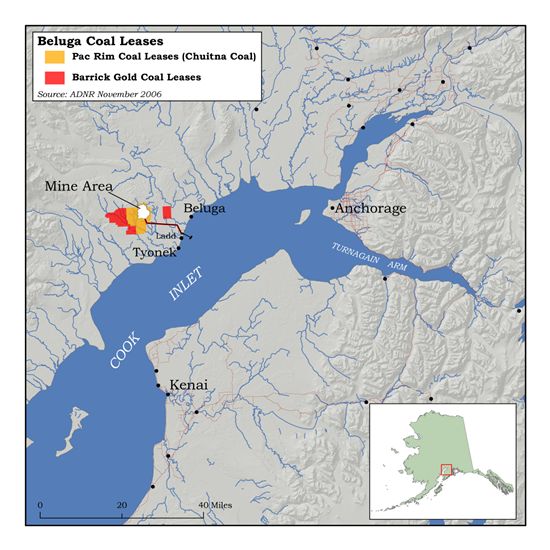Purpose
- Investigates the causes of economic imbalances.
Summary
Alaska possesses roughly half the nation's coal reserves, and with rising energy demand, Asian countries increasingly look to Alaska coal reserves for "cheap" and abundant fuel sources. The Chuitna coal mine in Southcentral Alaska, if approved, will secure the markets and install the infrastructure that will transform Alaska into a major coal export province. Yet Cook Inlet fisheries generate over $1 billion a year in economic activity, and the Chuitna coal mine would mine through 11 miles of salmon streams and discharge nearly 2 billion gallons a year of mine waste into fish habitat.

The proposed Chuitna coal strip mine is located approximately 45 miles west of Anchorage, near the community of Beluga and the Alaska Native Village of Tyonek.
Description
As permitting moves forward for the proposed Chuitna coal strip mine, state and federal agencies lack critical economic information needed to make informed decisions. In response, Cook Inletkeeper with support from the Walker Foundation, worked with the Center for Sustainable Policy to conduct net present value and benefit-cost analyses of the proposed Chuitna coal mine and surrounding Cook Inlet fisheries and natural resources. In July 2010, Inletkeeper entered a contract with John Talberth, Senior Economist at the Center for Sustainable Policy. Talberth and his team developed a detailed work plan, submitted information requests to relevant state and federal agencies to gather the data needed, developed a comprehensive list of all state, federal and local permits and approvals that allow Inletkeeper to make economic arguments to protect wild Alaskan salmon streams, submitted comments to Army Corps of Engineers, submitted comments to the Alaska Department of Natural Resources in support of Inletkeeper’s Unsuitable Lands Petition, and are completing the final net public benefit report.
Purpose
Failure to account for and internalize the true costs of energy production distorts free markets by causing an over-allocation or investment of resources in one use over more economically efficient alternatives. With respect to coal, failure to account for non-market externalities such as air and water pollution, habitat degradation, and carbon emissions along the entire lifecycle of coal production and consumption siphons scarce energy investment dollars away from more sustainable alternatives such as improved efficiency and renewables. Our net public benefits analysis of the Chuitna Coal Project investigated one of the prime causes of economic imbalances in energy markets: failure to account for the externalized costs of coal in decision-making processes for new mines.
Scope
Federal and state agencies are in the midst of permitting and environmental analysis for the proposed Chuitna coal strip mine in Southcentral Alaska, and they currently lack high quality information about the true economic costs and benefits of the mine. Together with Center for Sustainable Economy, Cook Inletkeeper produced a net public benefits analysis of the Chuitna Coal Project that accounts for all market and non-market effects and internalizes all hidden externalized costs of the Project over its 25-year expected life. Habitat loss, adverse effects on subsistence, air and water pollution, carbon emissions, and damage to recreational and sport fisheries are among significant externalized costs that are addressed. The analysis serves as an analytical model for decision makers contemplating coal mine authorizations in Alaska and throughout the U.S. By utilizing the benefit cost ratio, one of the primary metrics in developing public benefits analysis, decision makers now have the appropriate framework to rank various projects, or different alternatives of the same project seeking a limited source of public funds.
Information Dissemination
Inletkeeper formally released the results of this report through a press release and press conference on October 6, 2011, with PDF versions of the report available online. Local, state and national media outlets picked up the report, and direct letters and emails were sent to various agency heads, legislators and decision makers. Additionally, Inletkeeper send the alert to over 5000 people and groups within its email networks.
Project Link http://inletkeeper.org/blog/report-cook-inlet-salmon-resources-more-valuable-than-coal-for-china
Amount Approved$40,000.00
on 5/28/2010
(Check sent: 6/16/2010)